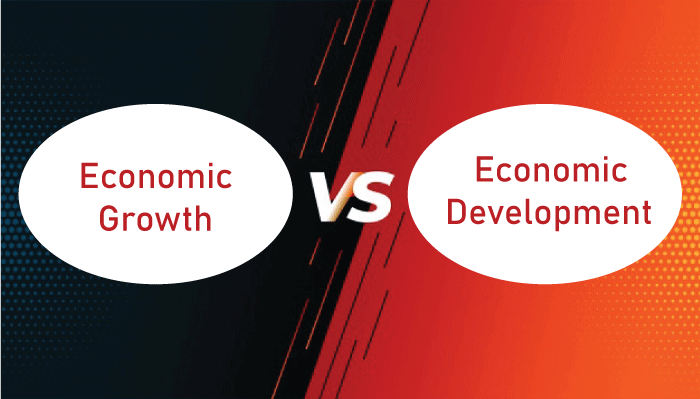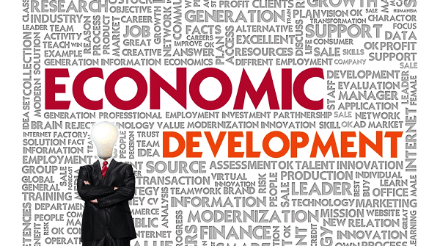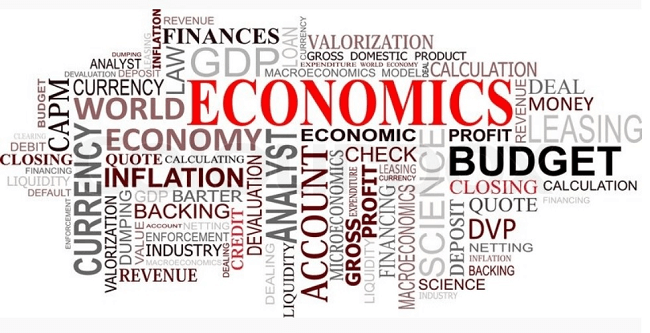Differences Between Economic Growth and Economic Development
Economic GrowthEconomic growth is an essential indicator of a nation's economic health, often calculated as the percentage rise in a nation's gross domestic product (GDP) or gross national product(GNP) during a specific period, typically a year or a quarter. While GNP is a measure of all the products and services generated by a country's citizens, wherever they may be, GDP is an indicator of all the products and services generated within a country's borders. Economic growth can be influenced by several factors, including
Many economic theories attempt to explain economic expansion. According to the traditional conception, which Adam Smith and others formulated, economic growth is the inevitable outcome of the functioning of free markets. According to the notion, as people and businesses act in their best interests, more products and services will be produced, resulting in greater wealth for everyone. The neoclassical concept, created in the late 19th and early 20th centuries, concentrates on technological advancement's function in promoting economic growth. This hypothesis contends that technological improvements result in higher production, which supports economic expansion. Several other government initiatives might encourage economic expansion. These consist of the following:
Economic DevelopmentThe process of enhancing a community's or nation's economic prosperity and standard of living is referred to as economic development. It is a broad term that refers to various things, including raising productivity, creating more employment with better pay, enhancing infrastructure, and expanding access to healthcare and education. 
Economic growth can take many forms, and the precise tactics and measures employed might differ significantly depending on the particular conditions and requirements of a given community or nation. There are, however, a few common elements that appear in debates about economic development Increasing productivity is one of the key components of economic development and can be done in many ways. For instance, spending money on training and education can improve the knowledge and skills of the workforce, boosting productivity. Similarly, funding Research and Development can contribute to creating new technologies and procedures to increase productivity. Creating new higher-paying jobs is a crucial aspect of economic development. This can be accomplished in several ways, such as by bringing new firms and industries to a region, assisting in expanding and growing current enterprises, and encouraging entrepreneurship and the development of small businesses. Infrastructure development is necessary for economic development as well. It can involve spending money on telecommunication services, other utilities, and transportation infrastructure, including roadways, bridges, and public transportation. Having better infrastructure can assist in making it simpler for people to get to work and for businesses to run, promoting economic growth. Finally, expanding access to healthcare and education is essential for economic development. Education may assist the workforce in becoming more skilled and knowledgeable, and healthcare can help a community's general health and well-being. A richer and more productive society can benefit from both of these aspects. The process of economic development is complicated and diverse, involving a variety of elements and tactics. Communities and nations can improve their economic well-being and quality of life by raising productivity, creating new and better-paid jobs, investing in infrastructure, and increasing access to healthcare and education. Importance of Economic Growth and Economic Development

Both economic growth and economic development are popular options on the market, but there are some key differences to be aware of.
ConclusionWe can generally state that economic growth and development have different concepts. Many of us occasionally mix up the terms "economic growth" and "economic development" and use them interchangeably. It's challenging to separate them, so we discussed the distinction between economic growth and development. Economic growth can occur for various reasons, and in its simplest form, it can be defined as an increase in the amount of national output. The numerous factors include the high-quality education presently offered in the country, technical advancements, or, as we may say, an increase in the value of the various commodities and services provided to a country's citizens by multiple sectors. The country's Gross Domestic Product, or GDP as we like it, is the best way to assess economic growth. Economic growth is not necessary, but it will not be able to explain economic development independently because a few other requirements must also exist. When it comes to economic progress, defining it is a difficult process because it entirely depends on an individual's point of view and it's moral philosophy. Nowadays, people can decide if something is excellent, awful, right, or wrong. Now, a lot of individuals have attempted to define economic growth. Still, the finest explanation comes from Michael Todaro, who said economic development improved self-esteem requirements, freedom from oppression, and more choice. We can look at the Human Development Index (HDI) to predict economic development. HDI considers several variables, including mortality and literacy rates, which impact productivity and drive economic growth. We shall now examine some fundamental distinctions regarding economic growth and economic development. While economic development focuses on enhancing people's moral character, economic growth concentrates on raising the nation's income and level of development. Economic development requires well-organized and structured organizations, whereas the latter does not. According to economists, even the approach is different between the two: economic growth requires a quantitative approach, whereas economic development requires a qualitative approach. Economic development is significantly more important than economic growth because it provides a more comprehensive picture of the status of the economy than growth does. Experts place a greater emphasis on economic development than growth. One other way to look at them is by examining their duration. We may readily determine Economic Growth by examining monthly, annual, or decade-by-decade data, making it possible to identify it in the short term, such as a year. Since it takes a long time to change people's perspectives and organizational structure, we must consider long periods of economic development, which may span several decades. Additionally, economic growth is frequently connected to the issues that industrialized countries face, whereas development issues worry developing nations. Despite having little impact on growth, the political environment is very important for economic development. To summarise, we can confidently say that economic growth tries to elevate society by causing it to advance in terms of national revenue, savings, and the overall organizational framework. At the same time, Only the Gross National Product (GNP) or the population's per capita income is used to determine economic growth. In addition, policymakers look to the GNP values to assess economic growth to determine the various policies governing a country. One might counter that economic growth is less significant than economic development. Still, it's important to note that without taking economic growth into account, it's impossible to measure economic development accurately.
Next TopicDifference between
|
 For Videos Join Our Youtube Channel: Join Now
For Videos Join Our Youtube Channel: Join Now
Feedback
- Send your Feedback to [email protected]
Help Others, Please Share










